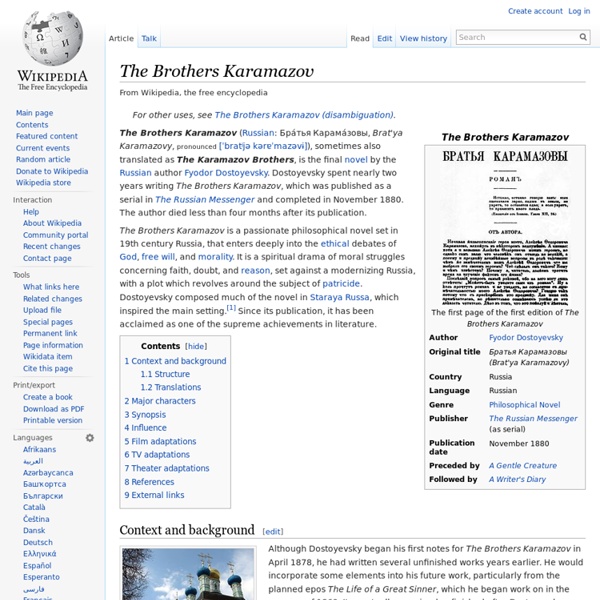Chris Huntington: The Last Book I Loved, The Brothers Karamazov
We were in the “international bookstore” of Xiamen, China, which is really a Chinese junk and bookstore but has half a dozen shelves of English books (such as Gossip Girl and 7 Habits of Highly Effective People). My wife found a Signet Classics edition of The Brothers Karamazov. “Do you want that?” “I’ve already read it,” I said. I put it back on the shelf, and we left. When I was twenty-three, I loved Jack Kerouac’s On the Road. For most of my life, I had avoided The Brothers Karamazov because I was afraid it would somehow encourage all my neuroses. I’m half-Chinese, half-Hoosier. I was in love with an American girl who was back in the States living with a law student. That year I was as much an Alyosha as I am ever going to be. But then I got married and divorced. I read it like the only child I was. My second wife had been hurt by her first husband and I swore to protect her, but then we were unable to have a child and I felt like a failure in every way. Nothing?
Don Sheehan
DOSTOEVSKY AND MEMORY ETERNAL An Eastern Orthodox Approach to the Brothers Karamazov by Donald Sheehan Central to Eastern Orthodox Christendom is the singing, at the end of every Orthodox funeral, of the song known as “Memory Eternal” (in Church Slavonic: Vechnaya Pamyat). This song also concludes Dostoevsky’s great, final novel, The Brothers Karamazov, when, following the funeral of the boy whom Alyosha Karamazov (and the circle of schoolboys around Alyosha) had deeply loved, Alyosha speaks to the boys about the funeral and about the meaning of the resurrection, with this brief song as their steady focus. My thesis is simply this: to know something of this song’s meaning is to comprehend both the Eastern Orthodox faith and Dostoevsky’s greatest novel. We can best approach the meaning of this song through following the connection between the Orthodox funeral services and the crucifixion of Christ. An elder is one who takes your soul, your will into his soul and into his will.
Afterword to The Brothers Karamozov | Author Sara Paretsky
A portrait of Dostoevsky hangs in my living room, drawn from photographs by my stepson Philip: Dostoevsky is his favorite writer, The Brothers Karamazov his favorite novel. The writer’s deep-set eyes are brooding, even forbidding; as I read and re-read Karamazov, and realized how little fit I am to discuss it, I felt his gaze scorching me for my impudence in taking on the task. I don’t read Russian. I don’t know much about Russian political and literary history, or about the Orthodox faith or Pushkin—Dostoevsky’s own favorite writer—and all these play a prominent role in The Brothers Karamazov. Dostoevsky grew up with a passion for literature. He resigned his military commission because his duties included flogging malefactors in the ranks, and he loathed corporal punishment, especially the excesses used in Russian peasant justice—as he makes clear in many places in Karamazov. Like other 19th-century Russians, he early grappled with issues of reform and how Russia might be saved.
Borrowed Fire: The Brothers Karamazov: The digressive narrator
Alexey Fyodorovitch Karamazov was the third son of Fyodor Pavlovitch Karamazov, a land owner well known in our district in his own day, and still remembered among us owing to his gloomy and tragic death, which happened thirteen years ago, and which I shall describe in its proper place. For the present I will only say that this “landowner”—for so we used to call him, although he hardly spent a day of his life on his own estate—was a strange type, yet one pretty frequently to be met with, a type abject and vicious and at the same time senseless. Thus begins The Brothers Karamazov by Fyodor Dostoevsky. And already, we find the great author seeming to break a basic rule, not just of fiction, but of writing in general. The crucial first sentence of the all-important first paragraph of this gigundous book, which we are about to commit ourselves to for the next, I dunno, thirty months--this sentence is misleading. So, fine.
A Karamazov Companion: Commentary on the Genesis, Language, and Style of ... - Victor Terras
Ivan Karamazov and The Devil
"An episode of Dostoevsky's Karamazov Brothers. Brilliant performance of Kirill Lavrov, great Russian actor (acts as both Ivan Karamazov and the devil). Kirill Lavrov passed away on April, 27, 2007. Directed by Ivan Pyryev, a prominent film maker, who died during the shooting process.(p) Mosfilm 1968." Ivan's visit from the Devil is a slice out of time.
Н. А. Некрасов. О погоде. Текст произведения. <Часть первая>. II. До сумерек
Ветер что-то удушлив не в меру, В нем зловещая нота звучит, Всё холеру — холеру — холеру — Тиф и всякую немочь сулит! Все больны, торжествует аптека И варит свои зелья гуртом; В целом городе нет человека, В ком бы желчь не кипела ключом; Муж, супругою страстно любимый, В этот день не понравится ей, И преступник, сегодня судимый, Вдвое больше получит плетей. Всюду встретишь жестокую сцену, — Полицейский, не в меру сердит, Тесаком, как в гранитную стену, В спину бедного Ваньки стучит. Чу! Под жестокой рукой человека Чуть жива, безобразно тоща, Надрывается лошадь-калека, Непосильную ношу влача. Я горячим рожден патриотом, Я весьма терпеливо стою, Если войско, несметное счетом, Переходит дорогу мою. Прибывает толпа ожидающих, Сколько дрожек, колясок, карет! Полно ждать! Я, продрогнув, домой побежал.



